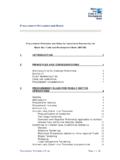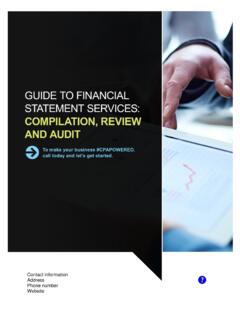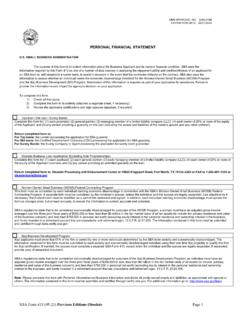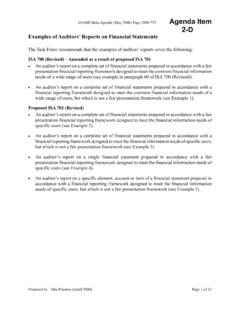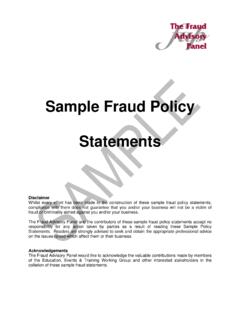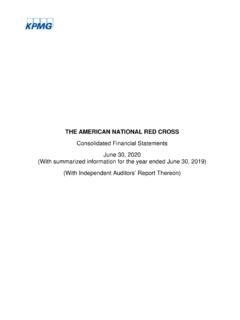Transcription of Financial Statements for the Year Ended 31 December 2020
1 BLACK SEA TRADE AND DEVELOPMENT BANK. Financial Statements for the Year Ended 31 December 2020. Together with Auditor's Report Table of Contents Page ---------------------------------------- ---------------------------------------- ---------------------------------------- --------- Independent Auditor's Report 2 5. Income Statement 6. Statement of Comprehensive Income 7. Statement of Financial Position 8. Statement of Changes in Members' Equity 9. Statement of Cash Flows 10. Notes to the Financial Statements 11 71. 1. Deloitte Certified Public Accountants 3a Fragkokklisias & Granikou str. Marousi Athens GR 151-25. Greece Tel: +30 210 6781 100. INDEPENDENT AUDITOR'S REPORT. To the Board of Directors and the Board of Governors of Black Sea Trade and Development Bank Report on the Audit of the Financial Statements Opinion We have audited the Financial Statements of Black Sea Trade and Development Bank (the Bank), which comprise the statement of Financial position as at 31 December 2020 and the Statements of income and comprehensive income, changes in equity and cash flows for the year then Ended , and notes to the Financial Statements , including a summary of significant accounting policies.
2 In our opinion, the accompanying Financial Statements present fairly, in all material respects, the Financial position of Black Sea Trade and Development Bank as at 31 December 2020, and its Financial performance and its cash flows for the year then Ended in accordance with International Financial Reporting Standards (IFRSs). Basis for Opinion We conducted our audit in accordance with International Standards on Auditing (ISAs) as these have been incorporated into Greek legislation. Our responsibilities under those standards are further described in the Auditor's Responsibilities for the Audit of the Financial Statements section of our report. We have been independent of the Bank during the whole period of our appointment in accordance with the International Ethics Standards Board for Accountants' Code of Ethics for Professional Accountants (IESBA Code) as incorporated into Greek legislation and the ethical requirements in Greece relevant to the audit of the Financial Statements and we have fulfilled our ethical requirements in accordance with the applicable legislation and the above mentioned Code of Ethics.
3 We believe that the audit evidence we have obtained is sufficient and appropriate to provide a basis for our opinion. Key Audit Matters Key audit matters are those matters that, in our professional judgment, were of most significance in our audit of the Financial Statements of the current year. These matters and the assessed risks of material misstatements were addressed in the context of our audit of the Financial Statements as a whole, and in forming our opinion thereon, and we do not provide a separate opinion on these matters. 2. Key audit matter How the matter was addressed in our audit Expected Credit Loss on Loans at amortized cost Loans at amortized cost of the Bank amounted Based on our risk assessment and following a to EUR 2,030 million as at 31 December 2020 risk based approach, we have evaluated the (EUR 1,808 million as at 31 December 2019) impairment methodologies applied and and loss impairment to EUR 56 million (EUR 43 assumptions made by Management in relation million as at 31 December 2019) as presented to this key audit matter, which included, inter on the Statement of Financial Position.
4 Alia, the following audit procedures: he Bank measures Expected Credit Losses - we obtained an understanding of the (ECL) for loans at amortized cost both on an procedures and evaluated the design and individual and a collective basis. implementation of relevant internal controls within the business process. The estimation of ECL on loans at amortized - we assessed the appropriateness of the cost is considered a key audit matter as it is a Bank's IFRS 9 impairment methodologies. complex calculation that involves the use of a - with the support of our internal Financial risk number of assumptions and parameters such as modeling specialists we assessed the probability of default (PD), Loss Given Default reasonableness of Management's (LGD) and Exposure at Default (EAD) as well as assumptions and input data used in the assumptions around the inputs used and model, including the analysis of the probability weight of the multiple economic forecasted macroeconomic variables.
5 We scenarios. tested the mechanical elements of the calculations such as the EAD, the PD and Significant Management judgements also stage allocation and reperformed the relates to the criteria used for the staging calculation of the ECL on a sample basis. assessment of loans at amortized cost. - we tested the accuracy and completeness of critical data used in the ECL calculation by Management provided further information about agreeing a sample of ECL calculation data principles and accounting policies for points to source systems or documentation. determining the allowance for impairment on - on a sample basis we assessed the loans at amortized cost and the management of reasonableness of the estimated expected credit risk in notes , 5, 12 and 15 to the credit loss for the individually assessed Financial Statements . credit impaired exposures. - we assessed the appropriateness of any post model adjustment.
6 We assessed the adequacy and completeness of the Bank's disclosures in respect of credit risk, structure and quality of loan portfolio and impairment allowance in accordance with IFRS. 9. Other Information Management is responsible for the other information. The other information comprises the information included in the Annual report, but does not include the Financial Statements and our auditor's report thereon. Our opinion on the Financial Statements does not cover the other information and we will not express any form of assurance conclusion thereon. In connection with our audit of the Financial Statements , our responsibility is to read the other information and, in doing so, consider whether the other information is materially inconsistent with the Financial Statements or our knowledge obtained in the audit, or otherwise appears to be materially misstated. If, based on the work we have performed, we conclude that there is a material misstatement in this other information, we are required to report that fact.
7 We have nothing to report in this regard. 3. Responsibilities of Management and Those Charged with Governance for the Financial Statements Management is responsible for the preparation and fair presentation of the Financial Statements in accordance with IFRSs, and for such internal control as Management determines is necessary to enable the preparation of Financial Statements that are free from material misstatement, whether due to fraud or error. In preparing the Financial Statements , Management is responsible for assessing the Bank's ability to continue as a going concern, disclosing, as applicable, matters related to going concern and using the going concern basis of accounting unless Management either intends to liquidate the Bank or to cease operations, or has no realistic alternative but to do so. The Audit Committee of the Bank is responsible for overseeing the Bank's Financial reporting process.
8 Auditor's Responsibilities for the Audit of the Financial Statements Our objectives are to obtain reasonable assurance about whether the Financial Statements as a whole are free from material misstatement, whether due to fraud or error, and to issue an auditor's report that includes our opinion. Reasonable assurance is a high level of assurance, but is not a guarantee that an audit conducted in accordance with ISAs, as these have been incorporated into Greek legislation, will always detect a material misstatement when it exists. Misstatements can arise from fraud or error and are considered material if, individually or in the aggregate, they could reasonably be expected to influence the economic decisions of users taken on the basis of these Financial Statements . As part of an audit in accordance with ISAs, as these have been incorporated into Greek legislation, we exercise professional judgment and maintain professional skepticism throughout the audit.
9 We also: Identify and assess the risks of material misstatement of the Financial Statements , whether due to fraud or error, design and perform audit procedures responsive to those risks, and obtain audit evidence that is sufficient and appropriate to provide a basis for our opinion. The risk of not detecting a material misstatement resulting from fraud is higher than for one resulting from error, as fraud may involve collusion, forgery, intentional omissions, misrepresentations, or the override of internal control. Obtain an understanding of internal control relevant to the audit in order to design audit procedures that are appropriate in the circumstances, but not for the purpose of expressing an opinion on the effectiveness of the Bank's internal control. Evaluate the appropriateness of accounting policies used and the reasonableness of accounting estimates and related disclosures made by Management.
10 Conclude on the appropriateness of Management's use of the going concern basis of accounting and, based on the audit evidence obtained, whether a material uncertainty exists related to events or conditions that may cast significant doubt on the Bank's ability to continue as a going concern. If we conclude that a material uncertainty exists, we are required to draw attention in our auditor's report to the related disclosures in the Financial Statements or, if such disclosures are inadequate, to modify our opinion. Our conclusions are based on the audit evidence obtained up to the date of our auditor's report. However, future events or conditions may cause the Bank to cease to continue as a going concern. Evaluate the overall presentation, structure and content of the Financial Statements , including the disclosures, and whether the Financial Statements represent the underlying transactions and events in a manner that achieves fair presentation.


